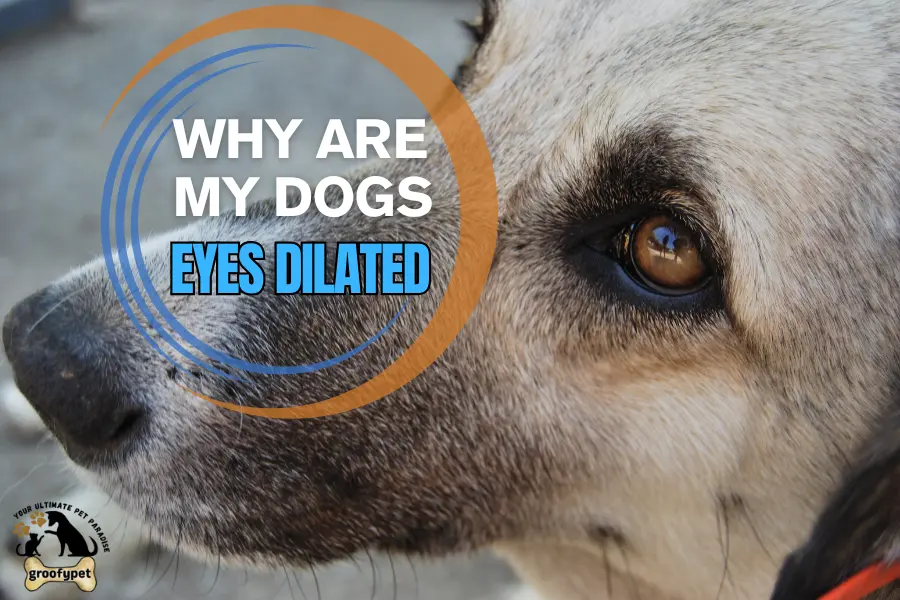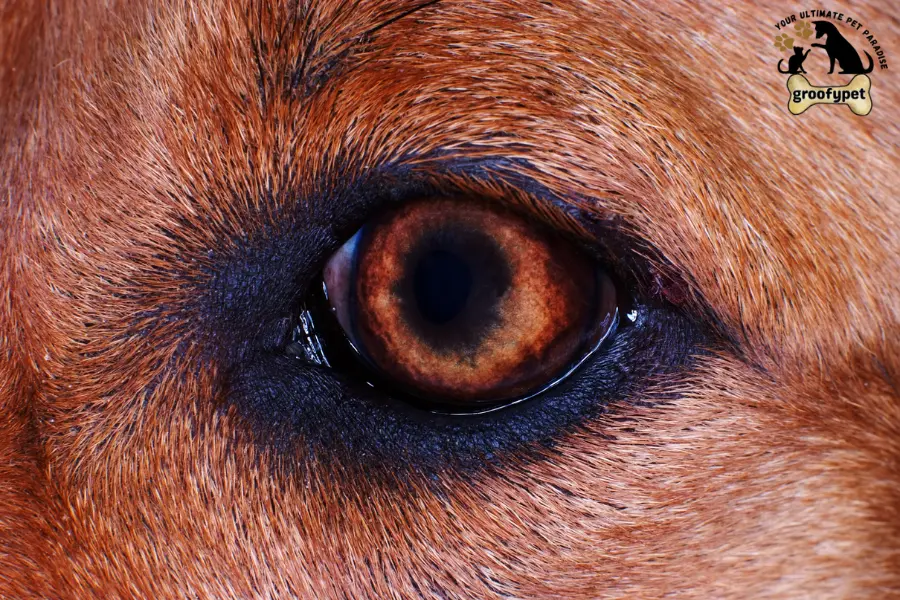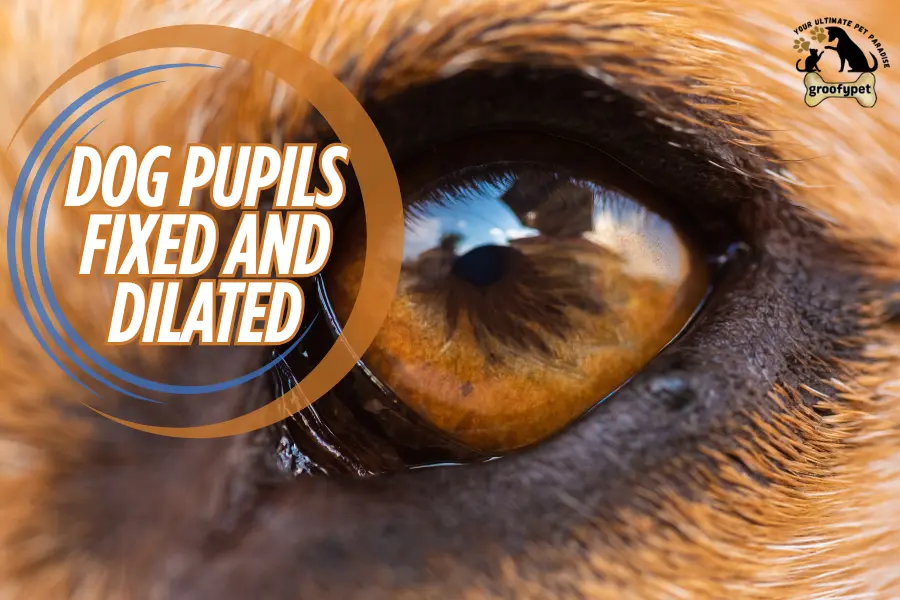
Dogs pupils naturally change size depending on light and emotion. But why are my dogs eyes dilated when there’s no reason? Pupils get big in low light, but they can also react to stress, fear or even pain. In some cases this could point to health issues like glaucoma or brain problems. Knowing what’s normal and what’s not can help protect your dog vision.
You walk into the room, and suddenly your dog eyes look huge. You wonder, why are my dogs eyes dilated like that? It’s not dark. They aren’t playing. Is it something serious, or just normal behavior? Understanding what this change means can help you figure out if your dog is okay—or if a vet visit is needed.
Table of Contents
ToggleWhy are my dogs eyes dilated?
Your dog eyes tell you a lot—when they’re sleepy when they’re playful, and even when something’s wrong. But suddenly, those eyes look wide and strange. You stop and ask, Why are my dogs eyes dilated like that? Whether it’s a harmless reaction or a sign of illness knowing the difference can make all the difference.
It means you’re noticing larger than normal pupils in your dog. This can happen because of lighting, emotions or a health issue. Sometimes it’s normal, like during play or fear. Other times, it can point to pain, vision problems, or a reaction to medicine. Watching your dog’s full behavior is the key to knowing what it really means.
What does it mean when a dog eyes are dilated?
When a dog eyes are dilated it means their pupils are larger than usual. Pupils change size to adjust to light but they can also respond to emotions or health issues. If the room is dark your dog’s pupils may get big so they can see better. This is normal and not a reason to worry. But if the eyes stay large in normal light it may be a sign something is wrong. Dilated eyes can mean fear, pain or even a problem with the brain. Watching your dog behavior can help you understand what’s going on.Understanding Pupil Size in Dogs
Pupil size helps dogs see clearly in different lighting. When it’s dark the pupils get big to let in more light. In bright places they get smaller to protect the eyes. If a dog pupils stay large even in daylight, it might mean the dog is having trouble. It may point to stress or a medical issue. Knowing the difference is important so you can help your pet.
Is it normal for a dog eyes to be dilated?
Yes, it can be normal depending on the situation. If your dog is excited, scaredor in a dark room, big pupils are nothing to worry about. Dog eyes respond to what’s happening around them just like ours do. But if the pupils stay big for a long time, even when the dog is calm, it could be a warning sign. Normal dilation goes away once the dog relaxes or the lighting changes. Constant dilation needs a vet check.
Signs of normal vs. abnormal dilation
Normal dilation happens for short periods. Your dog might have big eyes after waking up or during play. That’s okay. But if your dog’s eyes stay big even when resting or in bright light, it may be abnormal. You might also notice changes like bumping into things or being more nervous. These are signs that something else might be going on. Always watch how your dog acts with eye changes.

Why are my dog eyes always dilated?
If your dog’s eyes are always dilated, it’s time to look closerand dog pupils fixed and dilated. It may be stress, a health problem, or even a side effect of medicine. Dogs who are often scared or in pain can have wide pupils. Light doesn’t always cause dilation. Emotions can too. Constant dilation should never be ignored. It may be your dog’s way of showing something is wrong.
Dog dilated pupils lethargy
If your dog has dilated pupils and appears lethargic, it may be a sign of a serious health issue like neurological problems, toxin exposure, or severe pain. This combination of symptoms isn’t normal and shouldn’t be ignored. Contact your veterinarian immediately for a proper diagnosis and urgent care.
Common Causes of Dilated Eyes in Dogs
Certain health problems can cause dilated eyes.
1. Natural Responses: Light and Emotion
Dog pupils naturally dilate in low light to improve vision like in humans. You’ll also see dilation during emotional responses such as excitement and fear.
2. Pain and Discomfort
Why are my dogs eyes dilated? Dilated pupils can indicate pain. If your dog has been injured , limping or is showing other signs of discomfort pupil enlargement could be a reaction to physical distress.
3. Neurological Conditions
Issues like brain trauma, tumors or neurological disorders may lead to pupil dilation. If one pupil is larger than the other a condition called anisocoria, this may point to a serious neurological issue needing immediate attention.
Eye-Related Health Problems
1. Glaucoma
Glaucoma increases pressure inside the eye causing the pupil to enlarge. It’s painful and may lead to permanent vision loss if untreated.
2. Retinal Diseases
Damage or degeneration of the retina can interfere with eye responds to light leading to abnormally dilated pupils. This includes conditions like retinal detachment or degeneration.
3. Optic Nerve Damage
The optic nerve connects the eye to the brain. Injury or disease affecting this nerve may prevent the pupil from reacting to light resulting in dilation.
4. Medication Side Effects
Some drugs especially eye medications like atropine, can cause temporary dilation. Always check with your vet if you’re unsure about the side effects of your dog prescription.
5. Age Related Changes
Older dogs often develop nuclear sclerosis a clouding of the lens that can make the pupils appear more permanently dilated.
6. Stress and Anxiety
Dogs may show dilated pupils during high stress situations like vet visits, thunderstorms or car rides.
Symptoms to Watch for Dilated eyes
- Red or irritated eyes
- Cloudy appearance
- Excessive tearing or discharge
- Blinking frequently
- Sudden changes in behavior
- Disorientation or sign of vision loss
If your dog displays any of these symptoms along with dilated eyes consult a veterinarian as soon as possible.
When to See a Veterinarian

- Persistent pupil dilation
- One pupil larger than the other
- Signs of pain, seizure or blindness
- Sudden disorientation
Your vet may perform tests such as:
- Ophthalmoscopy
- Tonometry (to check eye pressure)
- Neurological evaluation (for brain and nerve assessment)
- Treatment Options
For Eye Condition
- Glaucoma: Medication or surgery to relieve pressure
- Infections or Injuries: Antibiotics or healing eye drops
For Neurological Issues
- Diagnosis treatment may include medication and surgery
For Toxic Reactions
- Immediate action involves inducing vomiting activated charcoal or hospital treatment to remove toxins.
Preventing Eye Health Problem
- Schedule regular vet checkups to catch issues early
- Avoid toxic substances like plants and chemicals.
- Keep your dog environment safe and injury free.
- Pay attention to behavioral changes and vision related struggles.
Emotional and physical causes
- Dogs react to fear and pain just like humans.
- If they’re hurt or scared, their pupils might stay big.
- A loud noise, being alone, or even a visit to the vet can trigger this.
- Physical problems like head injuries or eye issues can also keep pupils wide.
- Some dogs may have anxiety that shows in their eyes.
- Knowing your dog’s normal behavior helps spot when something is off.
Dog pupils fixed and dilated
If your dog pupils are fixed and dilated it could indicate a critical medical emergency involving brain trauma, poisoning, or severe neurological damage. Unlike normal dilation that responds to light or excitement fixed dilation means the pupils do not react to changes in light often a sign that the brain isn’t sending or receiving signals properly.

This symptom may also occur after a seizure or head injury if accompanied by loss of balance, disorientation or unconsciousness. Immediate veterinary evaluation is crucial, as delayed treatment can lead to permanent damage or be life-threatening.
Health problems that cause dilated pupils in dogs
Glaucoma is one common issue. It raises pressure in the eye and makes the pupil stay open. High blood pressure, head trauma, and brain tumors can do the same. These are serious and need fast help. If your dog’s eyes are big and they act strange, call the vet right away. Don’t wait.
List of health issues to watch for
- Glaucoma: Can cause pain and vision loss.
- Brain injury: May affect pupil response
- Tumors: Pressure in the brain can widen pupils.
- High blood pressure: It affects eye health.
- Poisoning: Some toxins cause pupil changes.
- Neurological disorders: It also affect how pupils respond to light.
Can medication cause my dog eyes to be dilated?
Yes, some medicines can cause pupil changes. Eye drops, calming meds, or even allergy pills might make your dog’s eyes look wide. This is usually a short-term effect. Always check the label or ask your vet if this is normal. If dilation lasts too long or your dog seems unwell, the medicine may not be right. Call your vet to be safe.
Also Read : Calcium rich foods for dogs
Common medications that affect eyes
- Atropine eye drops: Used for eye exams or pain
- Sedatives: May relax muscles and affect eyes
- Pain relievers: Some affect nerves and eyes.
- Allergy meds: Can change how eyes react to light.
Is my dog going blind if their pupils stay big?
Not always, but it’s one sign of vision trouble. Dogs who are losing sight may have large pupils all the time. They also may walk into things or seem confused in new places. If your dog has trouble seeing and their eyes stay big, call your vet. Early help can make a big difference. Don’t assume it’s just age.
How to Check for Signs of Blindness?
Try simple tests at home. Shine a small light near your dog’s eye (not directly in it). If the pupil stays big, that may be a sign. Toss a toy or wave your hand to see if they follow it. Blind dogs may seem lost in new areas. These clues help your vet know what’s wrong.
How pain can affect a dog eyes?
Pain can change how your dog’s eyes look. When dogs hurt, their pupils may get big. This is their body’s way of dealing with stress. Headaches, tooth pain, or joint pain can cause this. You may also notice whining, shaking, or hiding. Big pupils are one of many signs that your dog may be hurting.
Body signs that go with pupil changes
- Hiding or avoiding people
- Shaking or trembling
- Whining or whimpering
- Refusing food
- Acting restless or pacing
- Holding head low
My dog eyes are dilated and he’s acting weird What should I do?
If your dog’s eyes are big and they act strange, don’t wait. These signs could mean a serious health problem. Look for things like falling over, bumping into walls, or sudden fear. These may mean something is wrong with the brain or nerves. Call your vet or go to an emergency clinic. It’s better to be safe.
What behavior changes to watch for?
- Acting scared for no reason
- Losing balance or falling
- Not responding to name
- Sleeping too much or not at all
- Rapid eye movements
- Walking in circles
When should I call the vet?
Call the vet if your dog’s eyes stay big for more than a few hours. Also call if they act odd or seem sick. Dilated pupils along with other symptoms are a red flag. The sooner you act, the better your dog’s chance of healing. Even if it ends up being nothing, it’s worth checking.
Emergency signs that need vet care
- Vomiting or diarrhea
- Bumping into furniture
- Not eating or drinking
- Trouble walking
- Red or cloudy eyes
- Extreme tiredness
What will the vet check for?
The vet will start by looking into your dog eyes with a light. They may test eye pressure or do a vision test. Blood work might be needed to find problems inside the body. In some cases, the vet may suggest a brain scan. These steps help find the real cause behind the big pupils.
Tests the vet may run
- Eye pressure test (tonometry)
- Light response test
- Vision test with objects or movement
- Blood tests for infection or toxins
- Neurological exam
How to protect your dog eyes at Home?
Keeping your dog’s eyes safe is easy with small steps. Don’t let them hang their heads out of car windows. Keep sharp items off the floor. Clean their face gently if they get dirt near their eyes. Use dog-safe wipes or water. Watch for signs of redness, blinking, or rubbing. These mean it’s time for a vet check.
Everyday tips to keep eyes healthy
- Check eyes daily for dirt or redness.
- Keep harsh cleaners out of reach.
- Use a cone if your dog scratches a lot.
- Feed a healthy diet to support eye health.
- Visit the vet for regular eye checks.
When should I worry about my dog dilated pupils?
You should worry if your dog’s eyes stay big for a long time especially in normal light. If they also act strang like bumping into things seeming confused or being very tired, it could be serious. Sudden changes without a clear reason are a red flag. Pain, illness, or a problem with the brain could be the cause. It’s always better to call the vet if you’re unsure. Fast help can make a big difference.
Do dog eyes dilate when they love you?
Dog eyes can get big when they feel happy or loving. When your dog looks at you with wide and relaxed eyes it’s a sign of trust and comfort. People’s eyes get big when they are excited.So if your dog gives you those soft and big eyes it’sa a good thing.
Why do my dog pupils get big when he looks at me?
Your dog pupils might get big when he looks at you because he feels happy or excited. Dogs show feeling with their eyes. It’s a normal way dogs show affection or interest. As long as he seems relaxed, there’s no reason to worry.
Why do my dog eyes get so big?
Big eyes in dogs can mean they are alert, surprised or full of energy. It can also show fear, love or curiosity. Dogs use their eyes a lot to talk to us. If your dog’s eyes go big for a few seconds while playing or looking at you it’s nothing bad. But if they stay like that too long or your dog seems sick it’s best to check with the vet.
Final Thoughts
Why are my dogs eyes dilated? Dilated eyes in dogs can be caused by harmless to serious things. While dim lighting may cause temporary changes or persistent or uneven dilation especially with other symptom should never be ignored. Your dog eyes can reveal a lot about their health so always contact a vet when something feels off.
Is Chicken Fat Good for Dogs? Supercharge Meals!
What to Do If Dog Eats Garlic – Don’t Wait, Protect Them Now



